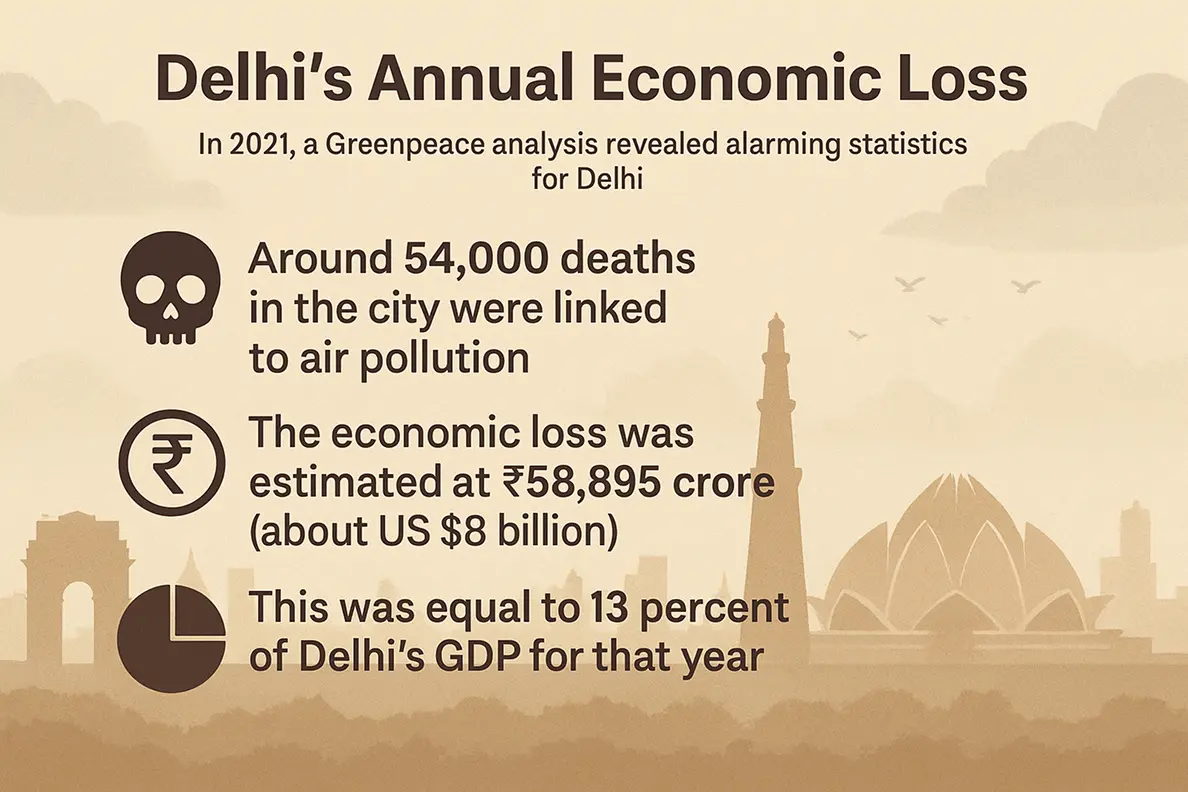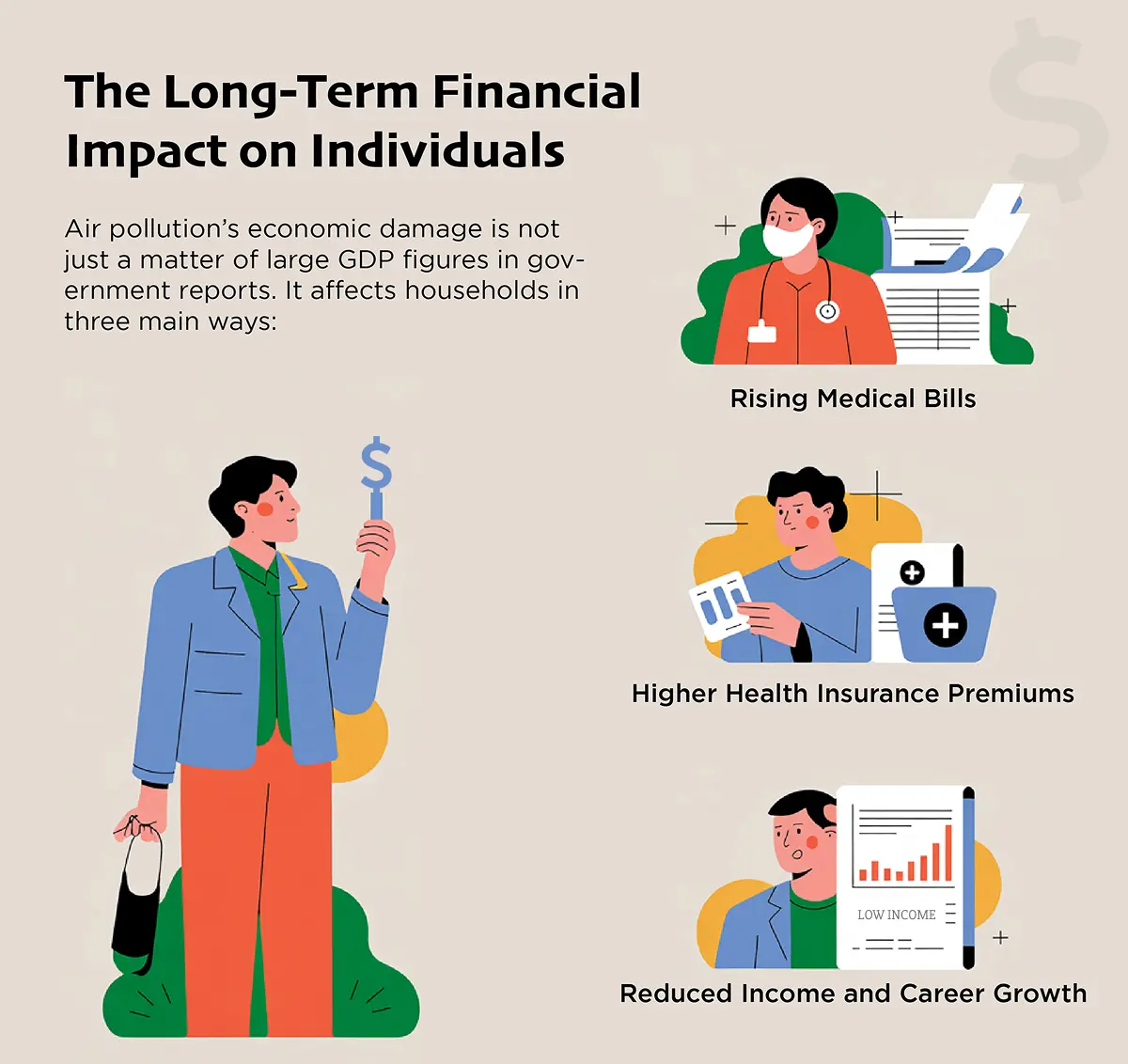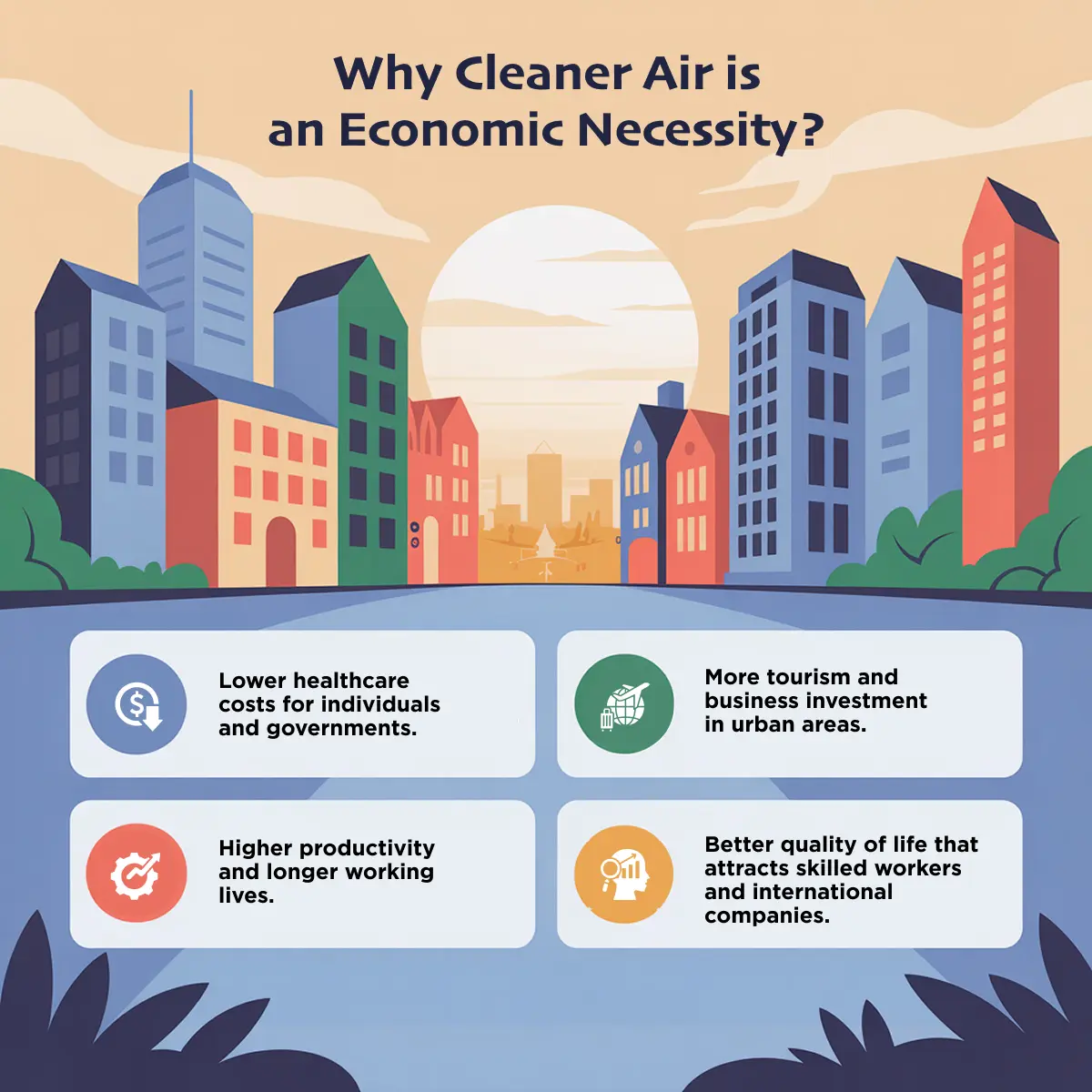When people talk about air pollution, most imagine smog-filled skies, coughing fits, or masks on busy streets. But beyond the obvious health effects lies another problem that is rarely discussed: the way air pollution damages your long-term financial health.
In today’s world, healthcare costs are rising fast. Even people who consider themselves healthy are facing severe illnesses such as strokes, heart attacks, and respiratory problems. This is not just a random trend. Studies show that long-term exposure to polluted air is a major contributor to these conditions.
The real danger is that air pollution creates a double financial burden. First, it increases your direct medical expenses. Second, it reduces your ability to earn by affecting productivity and working years. Over time, the impact can be devastating both for individual households and for the country’s economy
How Pollution Weakens Earning Potential and Economic Growth?
Delhi’s Annual Economic Loss
In 2021, a Greenpeace analysis revealed alarming statistics for Delhi:

- Around 54,000 deaths in the city were linked to air pollution.
- The economic loss was estimated at ₹58,895 crore (about US $8 billion).
- This was equal to 13 per cent of Delhi’s GDP for that year.
These figures include direct medical costs, lost workdays, and reduced productivity. They show that air pollution is not just a health hazard but also a massive economic drain.
The Lockdown Year Reality Check
Many expected the COVID-19 lockdown in 2020 to bring cleaner air and financial relief from pollution-related losses. However, a report from the Centre for Research on Energy and Clean Air (CREA) painted a different picture:
- In just the first half of 2020, Delhi’s air pollution caused an economic loss of about 5.8% of the city’s GDP, roughly US $3.5 billion.
- This included hospital admissions, premature births, and reduced productivity due to health problems.
Even with reduced industrial activity and traffic, pollution levels stayed high enough to cause major economic damage.
India’s National-Level Losses
The 2019 Lancet study brought the issue into national focus:
- India lost 1.36% of its GDP due to diseases and deaths linked to air pollution.
- Delhi’s regional loss was around 1.06% of GDP, highlighting the disproportionate burden on the capital.
How Air Pollution Hurts Productivity and Business?
Lost Workdays
Air pollution leads to widespread absenteeism in the workforce. According to research:
- India loses 1.3 billion workdays each year due to pollution-related illnesses.
- This costs about US $6 billion in direct absences.
- If we include reduced on-the-job performance (known as “presenteeism”), the loss rises to around US $24 billion.
- In 2019, Delhi alone lost about US $5.6 billion, which was nearly 6 per cent of its GDP.
Tourism Sector Losses
Tourism is another sector that suffers quietly due to poor air quality:
- Many international visitors avoid Delhi and other polluted cities during the smog season.
- This results in an estimated US $1.7 billion annual loss for India’s tourism sector.
- Cleaner air could directly boost tourist arrivals and spending.
National Output Loss
The Outlook Business report estimated that in 2019, India’s economy lost US $36.8 billion in output due to pollution-related illnesses and deaths. Delhi accounted for up to 6% of its state GDP loss in that year alone.
The Air Pollution Damages Your Long-Term Financial Health:
Air Pollution Damages Your Long-Term Financial Health is not just a matter of large GDP figures in government reports. It affects households in three main ways:

- Rising Medical Bills
Long-term exposure to polluted air increases the risk of chronic respiratory issues, cardiovascular diseases, diabetes complications, and even neurological conditions. These illnesses require frequent doctor visits, medications, diagnostic tests, and sometimes long-term hospital care. Over decades, these expenses can drain savings meant for education, retirement, or investments.
- Reduced Income and Career Growth
When illness forces you to take repeated sick leaves or limits your physical stamina, your productivity suffers. Employers may view frequent absences negatively, and career advancement opportunities can be missed. Throughout a career, even small income reductions add up to significant losses.
- Higher Health Insurance Premiums
Insurance companies assess risks based on where you live and the health profile of your region. If your city consistently has poor air quality, you are more likely to face higher premiums because insurers expect higher claim rates.
Why Cleaner Air is an Economic Necessity?
Air pollution is often discussed as an environmental or public health issue. But it is equally an economic problem. Cleaner air means:

- Lower healthcare costs for individuals and governments.
- Higher productivity and longer working lives.
- More tourism and business investment in urban areas.
- Better quality of life that attracts skilled workers and international companies.
What Can Be Done?
For individuals:
- Monitor your city’s Air Quality Index (AQI) daily and adjust outdoor activities accordingly.
- Use air purifiers at home and workplaces in high-pollution zones.
- Support and participate in local clean-air initiatives.
For policymakers:
- Stricter enforcement of industrial and vehicular emission norms.
- Expansion of green public transport systems.
- Incentives for renewable energy adoption.
- Urban planning that increases green cover and reduces pollution hotspots.
Final Thought
Air pollution is not only stealing years from our lives, it is also stealing money from our pockets. For a city like Delhi, the losses run into billions of dollars every year. For families, it can mean years of medical debt, reduced income, and lost opportunities.
Investing in cleaner air is not just a moral responsibility; it is a financial strategy. The healthier the air we breathe, the healthier our economy will be.